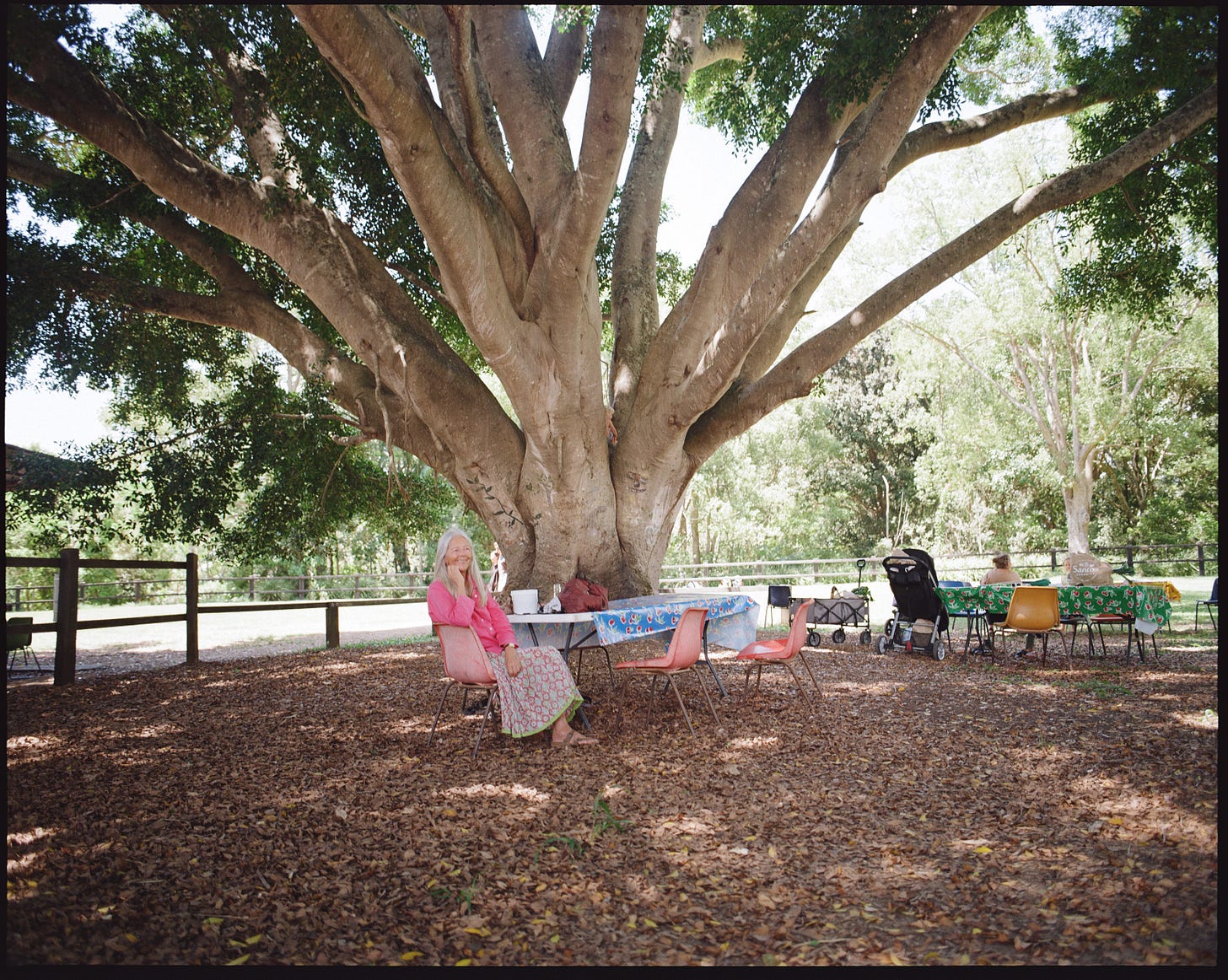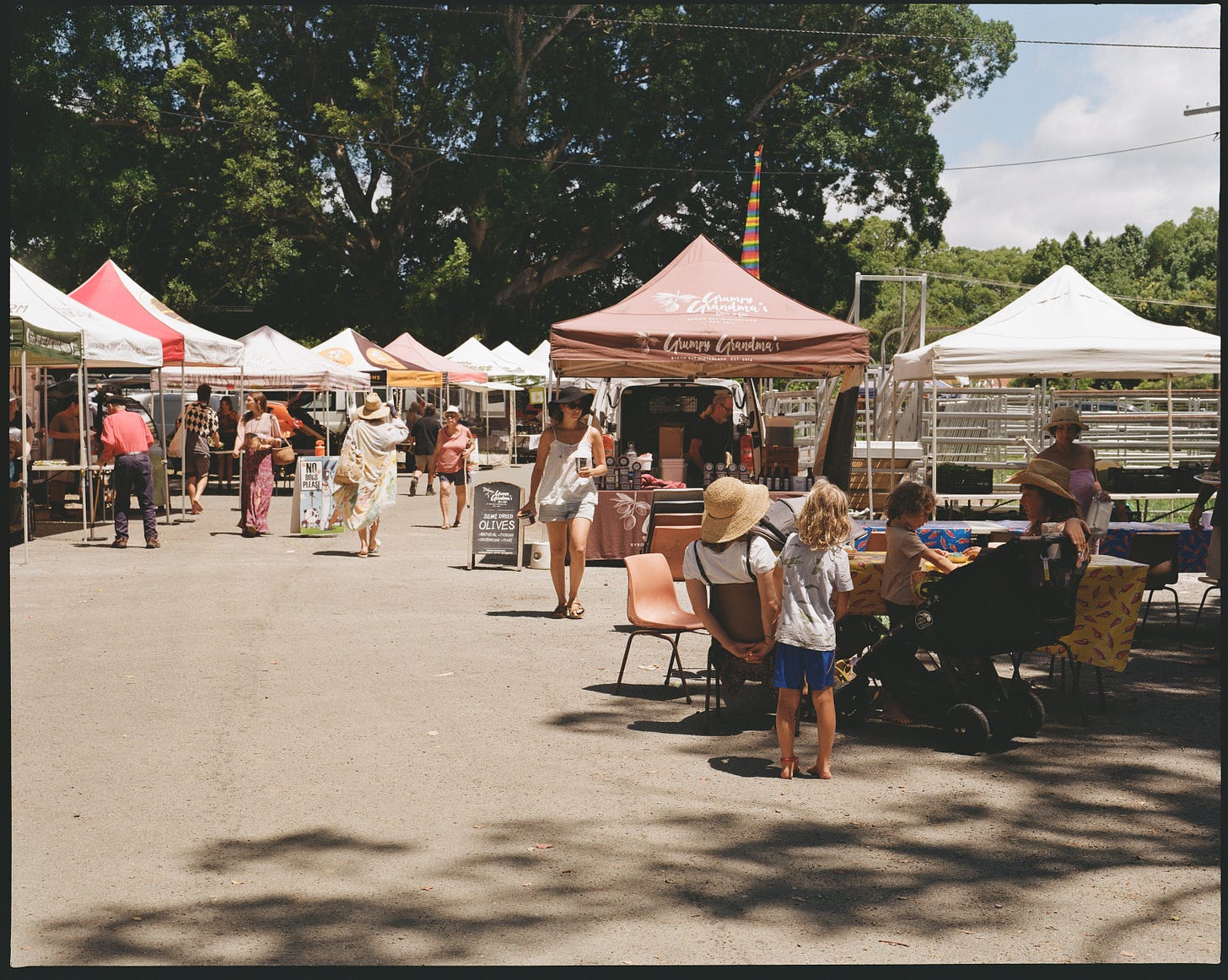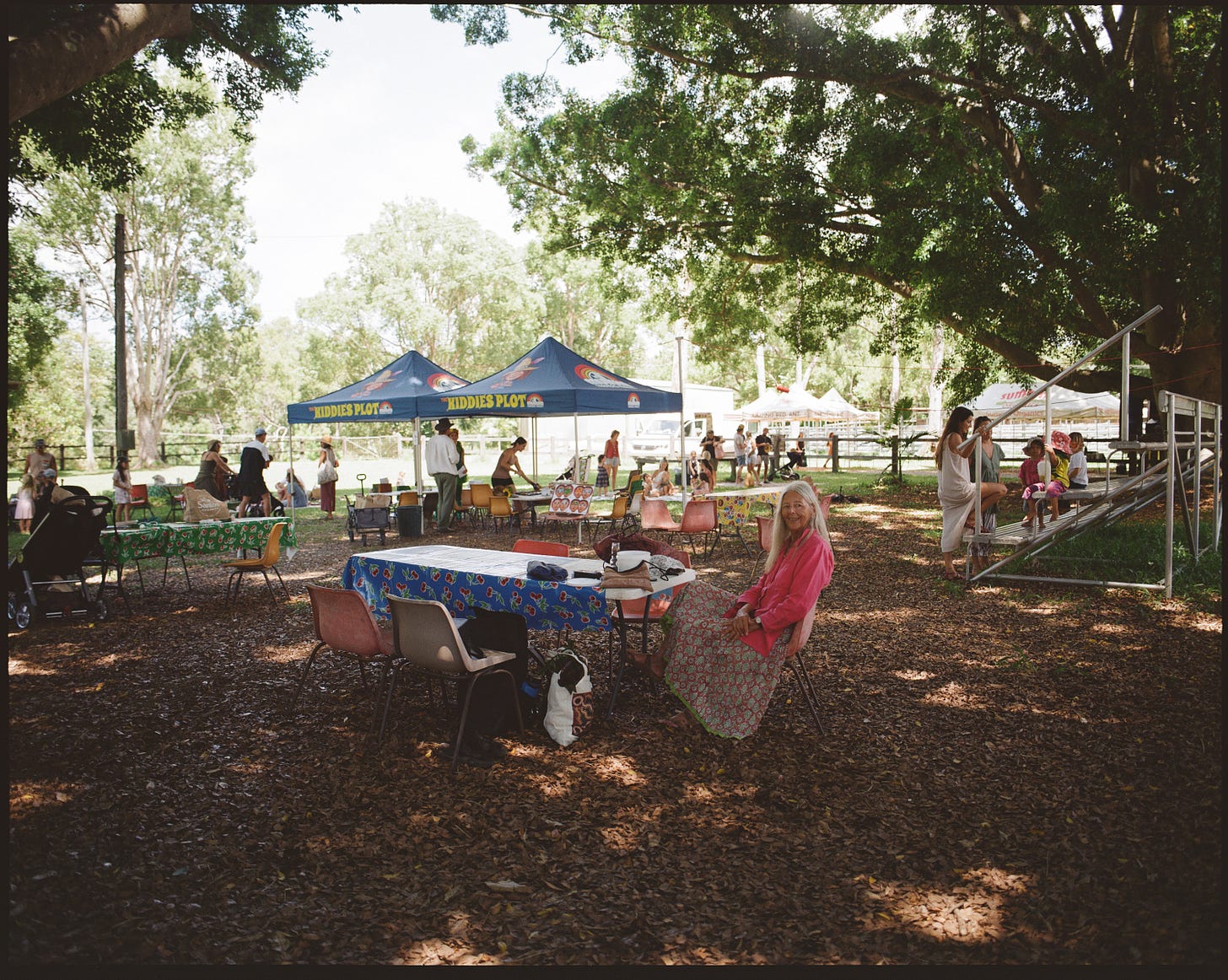A Local Life
an interview with Helena Norberg-Hodge
The term globalisation describes how local cultures and economies became interdependent through technology and trade. It is a process that developed over centuries — through military, cultural and government imperialism — which led to our current global society and the dispersion of goods, services, money, culture and people across national borders. While this global society is now ubiquitous, there was a time before the proliferation of affordable air travel when the step-by-step process of globalisation was visible, and Helena Norberg-Hodge bore witness.
Helena grew up near Stockholm. Her childhood was immersed in the wilderness of Sweden, and she developed a strong relationship with the environment.
“I always had a deep love of nature, but it took time for that to translate into being an activist. I wasn’t aware of the developing changes and issues.”
Her family was spread across Europe, exposing Helena to different cultures at a young age, while also developing her ability and interest in learning languages.
“I learned to speak languages mainly by spending time in different countries: I learned Italian in Italy; Spanish in Mexico; and because I was Swedish, English and German, I learned those languages earlier on. I appreciated the different lenses they gave me to see the world.”
At the age of 29, she moved to Paris to study French, the sixth language she spoke fluently. She worked with a company creating language education programs, and word spread through the artistic community of Paris of her linguistic ability.
“A German documentary filmmaker knew that I picked up languages very quickly and had worked with sound, so he wanted me to join a small documentary film team to go to this unknown place called Ladakh, to pick up the language and communicate with the people there.”
Nestled amongst the high peaks of the western Himalayas, close to Pakistan, Ladakh is an alpine desert spread across India and China on the Tibetan Plateau.
“I thought I was going for six weeks, but I was completely blown away by a very rare situation: a culture that had not been transformed by missionaries, that had not been affected by colonialism, and that in the mid 70s, had still not been affected by modern development.”
Due to its remote location, and the many conflicts for control of this territory, Ladakh only opened to tourists in the 1970s.
“I had an incredible privilege of learning to speak the language fluently at a point when the people I was engaged with never described themselves as poor, backward, or in any way inferior. I realised that many indigenous and traditional peoples who had contact in any way with the modern world, developed this sense of inferiority. The people I met exhibited the most incredible vitality and joy and sparkle that was so magical, and I fell in love with both the people and the place, so I decided not to go back when the film was finished.”
Helena documented the spoken language of Ladakhi with the written word for the first time, a process that brought a lot of lessons of oral communication and its role in society.
“Oral communication works with the flow of life in a way that the written word doesn't. When we’re communicating, we’re always communicating in the context of knowing whom we’re communicating with. Through face to face communication, there is all kinds of wealth for us to understand, it’s experiential knowledge, the knowledge in the here and now, in the living context of complexity. It’s not knowledge that has been transmitted to us about things from the outside world that we may have never seen and have no idea about, and this has been a very dangerous process through modernisation.”
Helena ended up staying in Ladakh for a few years before going back to Europe, and seeing Western culture in a very different light.
“I realised all the cultures I had come to know had been shaped by modernity, and by shaped I mean pulled away from the experience of deep relationships with nature. I also realised when I went back to my native country of Sweden, why there was already serious issues with depression, alcoholism, even suicide. People living in high rise apartments, the majority having been pulled away from smaller towns or villages into the main cities, where nothing is alive and often one person lives alone, sometimes with plastic plants and literally no contact with the living earth. That sense of deep loneliness and alienation was so clearly the main cause of depression.”
These realisations were inspired by witnessing the process of modernisation and globalisation in Ladakh.
“The process of development and growth was destroying the local economy. I saw butter in the local market in Ladakh, which had been transported over the Himalayas in diesel fuelled lorries for two weeks, and it would sell for half the price of the locally produced butter that was available five minutes walk away from the market. It opened my eyes to this artificial economy, where global traders have been given rights, they have been supported from the beginnings really, going back to pre-economic thinking, with the help of missionaries and traders, forcing and imposing production for export. Later on that was formalised with the basic principle in economics, the principle of comparative advantage, which says it's not in your interest to produce a diversity of things in your region or your country, you should focus on production for export, and then you can import everything else you need, and that was a trick on the part of global traders to enrich themselves and to impoverish local economies worldwide.”

This new understanding sparked a deep interest in the dynamics of the global economic system.
“I was alerted by friends from Malaysia in the mid 80s, how the process that had started after the Second World War — when the World Bank and the International Monetary Fund was set up — was a process of continuous trade treaties, it was all about ‘free trade’, and individual countries, including individual ministers and the greater population, were led to believe that supporting global trade was the only way to grow the economy, it was in everybody's interest. The environmental movement and the general public were asleep, not aware that ‘free trade’ was about freedom for global corporations and banks to come into a country and do as they please without any rules. And those same companies were of course not paying taxes, and around the world, in virtually every single country, the local, the regional and even the national businesses, and the activities of charities, they were being heavily regulated and taxed. So you had this completely crazy situation where the only winners were those who benefited from global trade.”
Helena was learning a new language, the process of globalisation, which has been a focus throughout her life.
“I realised over the many, many years in Ladakh — I was there for part of every year for about 40 years — inherent to the language was that it carried a profound respect for experiential knowledge, and that means local knowledge, it means knowledge about the specific trees, the water, the soil, the people that you engage with. It’s a deeper contextual and holistic knowledge. And I saw what happened when the modern world and modern education brought in a simplistic map, and we're now understanding this leads to a very superficial understanding of the infinite complexity, the constant movement and change in the living world.
“I think it is vital for anyone who wants to contribute to health and life on Earth to understand the dominant system better. I was forced to become aware of it, when I saw this black and white transition, as modernity came in step by step. I saw the link between schooling and urbanisation, I saw the link between the destruction of the local economy and urbanisation. Urbanisation and its dependence on faraway trade is really the enemy, which is completely structurally linked to monoculture, to biological and human monoculture. This is an economic path to death, it truly is, by trying to extinguish the key characteristics of life, we are extinguishing life itself.”
Helena was invited to speak across the western world, to share her insights on globalisation and her experiences in Ladakh. This led to writing a book, “Ancient Futures”, and making a film (with the same title). She went on to teach at an interdisciplinary department focused on energy and resources at the University of Berkeley in California, which supported a collaboration on renewable energy projects with the communities in Ladakh.
“Some people thought we were trying to improve the traditional culture but no, we were trying to present alternatives to what the government was bringing in, the corporations were bringing in, which was fossil fuel based. So we did small-scale renewable and particularly passive solar for water heating and space heating, and also some very small hydro projects to demonstrate there was an alternative.”
This was part of Helena’s focus on promoting what she calls “the economics of happiness”, and led to her founding a non-profit organisation Local Futures, to encourage ecological and social wellbeing by strengthening communities and local economies. During this period she also helped establish the Global Ecovillage Network, which links and supports intentional communities across the world who live harmoniously with their environment. Through connecting to these ecovillages, Helena and her husband John decided to live this way themselves. A friend recommended they visit Byron Bay, on Bundjalung Country in Australia, a town renowned for its beautiful landscape and a community that has embraced a nature-based lifestyle. Helena and John fell in love with the area and decided to call it home.
Helena’s work was centred on rebuilding the fabric of community and its connection with nature, and in Byron Shire she focused her efforts on creating a local food economy.
“I was and still am very committed to encouraging what I would call ruralisation, instead of urbanisation, and during the Covid Pandemic this partly happened around the world. If people don't understand the global, they often think localisation is just about supporting a local business or a local farmer, which overlooks what the market is. Often people support the local with no attention on creating systems that respect diversity, and that’s the key. When we don't respect diversity, we don't respect the quality of the food and for that you need to have a more direct communication with the market, you need to be closer to the land. This central focus on food and farming as part of localisation is key to what we've been doing.”
Soon after arriving in Byron Bay, she was asked to give talks where she met members of the community who were interested in her ideas. This led to the formation of a group that eventually formed the Byron Bay and Bangalow Farmers Markets. Several years later they established the New Brighton and Mullumbimby Farmers Markets. It was at the Mullumbimby Farmers Market where we met for this interview. My family lives nearby and through visiting these markets, and learning how they were formed, I first heard of Helena and her work.
The farmers markets in the Byron Shire are an essential thread in the fabric of the community. Not only is it the place to find good quality produce, it is where I meet with friends when I’m in the area. We often get something to eat from one of the many food stalls, and sit and listen to the different musicians who play music each week. If my friends bring their kids, there is a craft tent where children are supervised. I’ve visited farmers markets across the world, and there is something unique about what Helena and the community have created in the Byron Shire.
Helena and I were seated under a large fig tree, near the kids craft tent. As we ate the fruits of her work — I had purchased a bucket of fresh blueberries we were enjoying as we spoke — I could feel the experiential knowledge imbued in each of her words. I asked Helena what she felt we had lost through the process of globalisation.
“Humanity has lost countless species, languages, cultures, a wealth that we were never even aware of, so we're not even sure of how much we've lost. And we've lost time, which is a very precious wealth, because everything that's important, in terms of nurturing others and nurturing ourselves takes time, and that's extremely dangerous.
“We need to be aware that this loss of time and space means we're more vulnerable to respond to very simplistic, top down solutions, and we shouldn't be wasting our time on that, we need to take a deep breath and take the time to understand more deeply and broadly the system that's working against us, and now it has an army of algorithms that support the war machine, that support ill health. Just looking at the global food system and the localised alternatives is one of the best ways to understand what I'm saying. When you see it as a system, you see truly that it's contributing to our early death. Literally now, through the fake foods that are being pushed through, the generation that is growing up are going to die younger than their parent’s generation, and that’s in the most affluent countries.”
I finally asked what we have gained.
“We are gaining ever more awareness and we can see it, there’s a huge cultural turning that has been going on in reaction to a dominant economic, econometric, technological trajectory for hundreds of years. And there has been a reaction against it, there is a cultural turning of more appreciation for nature, more appreciation for the indigenous, more appreciation for the feminine, more appreciation for animals. There's such a hunger to reconnect to life, to the living, and that's translating into a broad shift in cultural values, particularly when you look at the map of it, it comes out of the urban industrial experience. The more people have experienced that, the more they want out.
“Our bodies and our souls are speaking to us. Our minds are still being drawn to the system, particularly through the help of very centralised, top down tools of social media, of the internet, through the way things are being framed. But we are making progress towards nature, towards life, and I think we now have to cultivate it in our hearts and our bodies through a reconnection to others and to every form of life, to the animals, to the plants. We can become part of a genuine community with all forms of life.”
By affirming all forms of life we affirm our own. It’s a simple yet complex way of being. But if we are to go on living, it’s our only way forward.
.
This story first appeared on eco-nnect.




